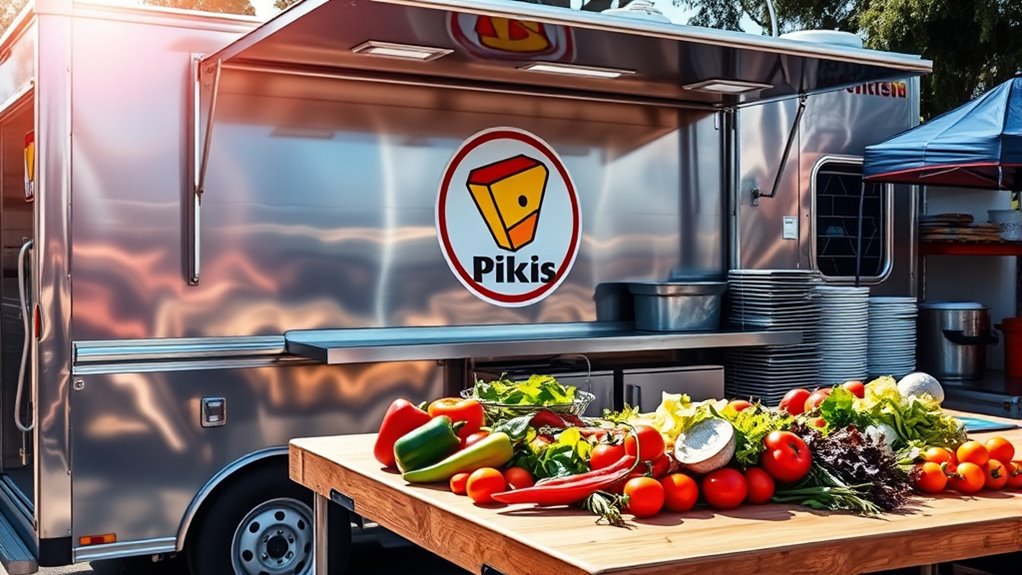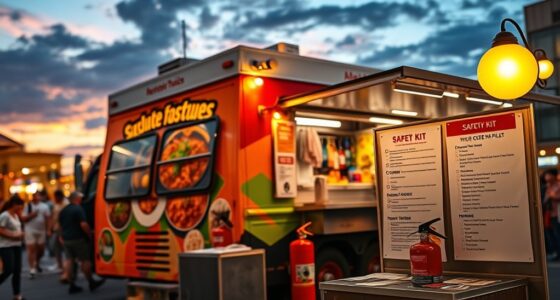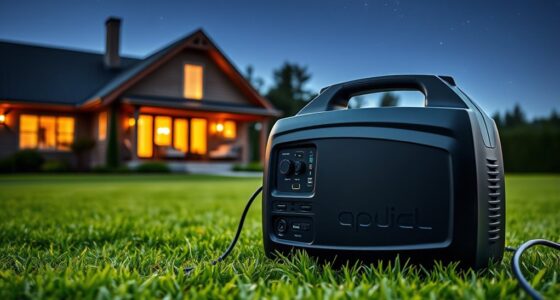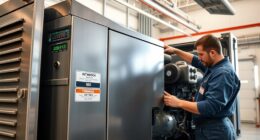To master your food truck’s power, start by listing all appliances to determine your total wattage needs, balancing high and low power devices. Choose reliable sources like solar panels, inverters, and generators, considering noise and portability. Proper wiring, grounding, and regular maintenance ensure safety and system efficiency. Managing loads carefully and using smart meters helps prevent overloads. Keep systems optimized, and you’ll run smoothly—more tips reveal how to keep everything dependable and efficient.
Key Takeaways
- Calculate total wattage by listing all appliances and balancing high- and low-demand devices for efficient power management.
- Use appropriate power sources like solar panels, inverters, and generators, considering cost, noise, and portability needs.
- Ensure electrical safety with proper wiring, insulation, grounding, and regular system inspections to prevent hazards.
- Select inverters that match peak power requirements and allow future expansion for reliable operation.
- Regularly maintain and monitor the system, including cleaning panels and checking connections, to optimize efficiency and longevity.
Understanding Your Power Needs
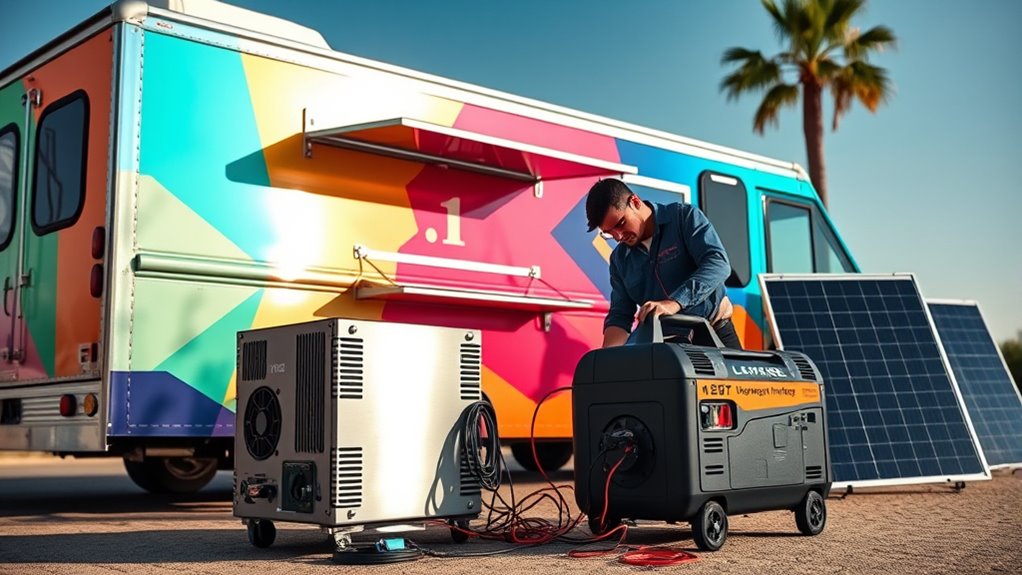
Before setting up your food truck’s electrical system, you need to understand your power needs. Start by listing all appliances, equipment, and lighting that will run simultaneously. This helps determine your total wattage requirement. Solar panels can be a great renewable source, but their size depends on your energy consumption and available roof space. To guarantee your system handles your load, you’ll need proper inverter sizing. An undersized inverter can cause power issues or damage your equipment, while an oversized one might be unnecessarily expensive. Calculate the peak power demand and select an inverter that exceeds this value by a comfortable margin. Knowing your power needs upfront streamlines your setup, ensures reliable operation, and helps you choose the right solar panels and inverter for your food truck. Proper inverter sizing is essential for safe and efficient operation, preventing overloads and equipment damage.
Power Sources for Food Trucks
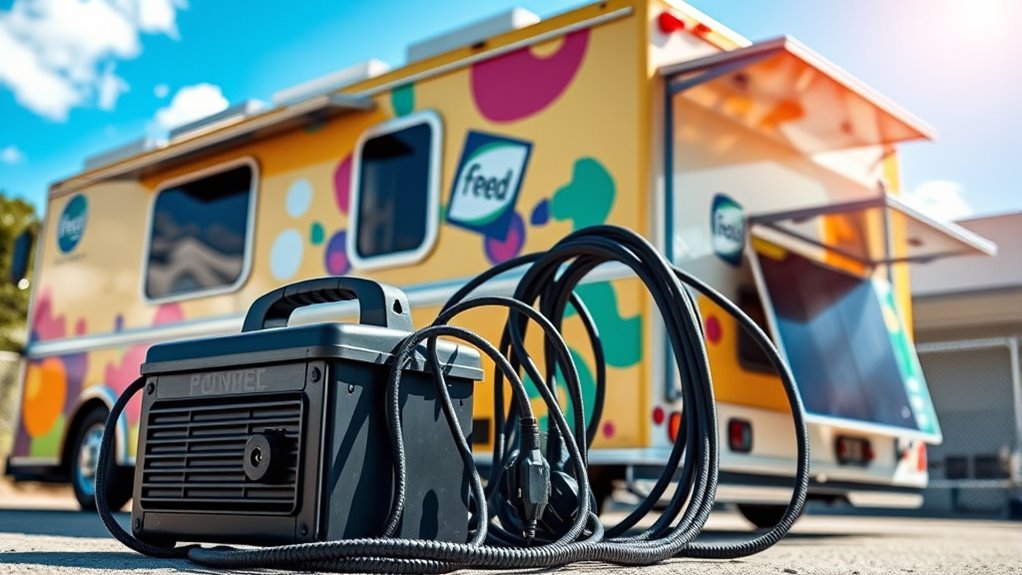
Food trucks rely on a variety of power sources to operate efficiently and reliably. Your choices include solar panels, generators, and inverter types. Solar panels can harness sunlight to reduce reliance on fuel, especially with high-quality inverter systems that convert DC to usable AC power. When selecting inverter types, consider whether you need pure sine wave inverters for sensitive equipment or modified sine wave options for less critical devices. Generators remain popular for consistent power, but they can be noisy and emit fumes. Solar panels paired with appropriate inverters offer a clean, renewable energy solution, reducing operating costs and environmental impact. Additionally, incorporating sensor technology can help monitor power usage and optimize energy efficiency. Balancing these sources based on your operational needs guarantees your food truck stays powered without interruptions.
Electrical Systems in Food Trucks
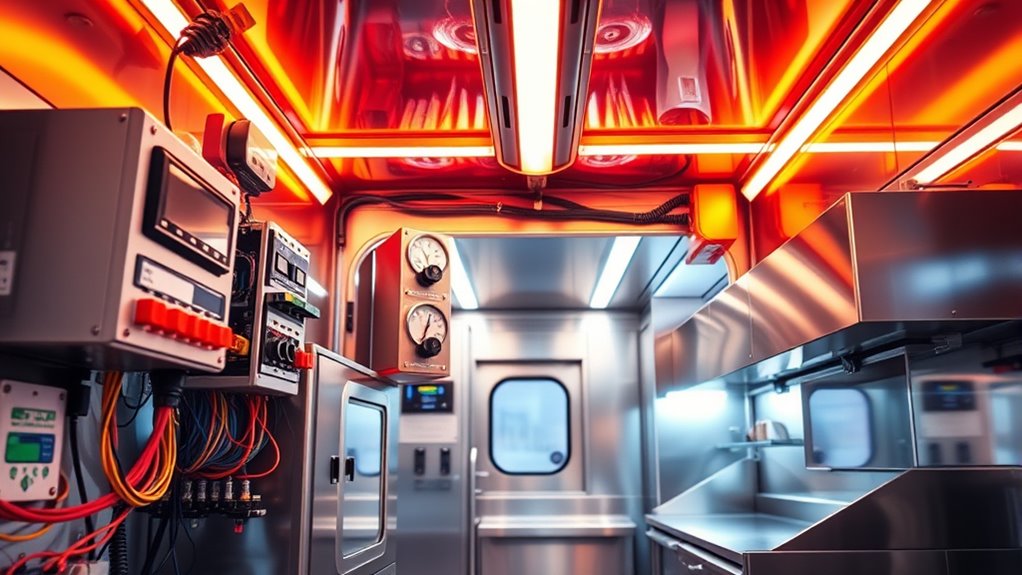
An efficient electrical system is the backbone of a well-functioning food truck, providing reliable power for all your appliances and equipment. You’ll want a mix of solar panels for renewable energy and inverter types to convert DC to AC power smoothly. Solar panels can be installed on your roof, reducing reliance on external sources. Inverters come in various types, such as pure sine wave and modified sine wave, each suited for different equipment needs. Here’s a quick comparison:
| Inverter Type | Best For | Cost |
|---|---|---|
| Pure Sine Wave | Sensitive electronics | Higher |
| Modified Sine Wave | Basic appliances | Lower |
| Hybrid | Solar + battery integration | Moderate |
Choosing the right setup guarantees your food truck runs efficiently without interruptions.
Generators: Types and Selection Tips
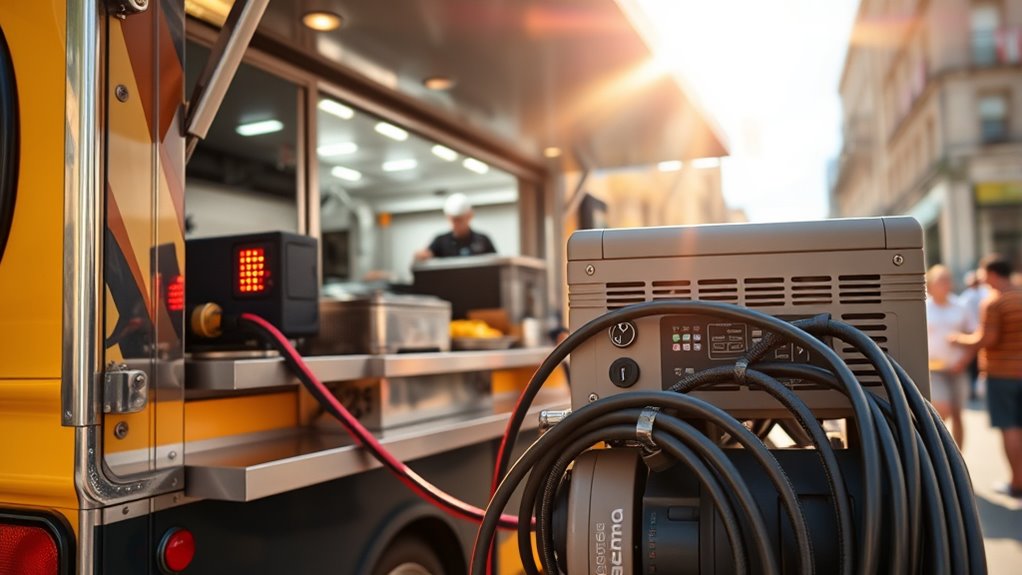
Choosing the right generator depends on factors like fuel type, power needs, and portability. You’ll want to contemplate how much noise it makes and how easy it is to move around your truck. Understanding these points helps you pick a reliable, efficient power source for your food truck. Additionally, considering the aesthetic appeal of the generator can enhance your overall setup and brand image.
Fuel Types Overview
When selecting a generator for your food truck, understanding the different fuel types is essential. Your choice impacts fuel efficiency, operational costs, and environmental impact. There are three main options:
- Gasoline: Widely available and easy to use, but tends to be less fuel-efficient and produces higher emissions.
- Propane: Offers cleaner burning and better fuel efficiency, making it a popular alternative fuel choice for food trucks.
- Diesel: Known for durability and higher fuel efficiency, but it may require more maintenance and has a bigger environmental footprint.
Choosing the right fuel type can also influence the performance tuning of your generator, ensuring it meets your power demands reliably and efficiently. Considering your needs, budget, and the availability of alternative fuels can help you choose a generator that’s reliable, cost-effective, and environmentally friendly.
Power Output Considerations
Understanding the power output of your generator is essential to guarantee your food truck can handle all your appliances and equipment without interruptions. You need enough wattage to support everything from your refrigerator to cooking devices. If you’re considering renewable energy options, solar power generators can supplement traditional units, reducing fuel use and emissions. Solar power is a quiet, maintenance-free choice that provides sustainable energy during the day, but ensure they have enough capacity for peak loads. When selecting a generator, check the continuous wattage rating to match your equipment’s demands. Overestimating your power needs guarantees smooth operation and avoids overloads. Combining traditional generators with renewable energy sources can create a reliable, eco-friendly power system tailored for your food truck. Proper power management is crucial to prevent overloads and ensure your equipment runs efficiently.
Noise and Portability
Selecting the right generator involves more than just matching wattage; noise level and portability play key roles in your food truck’s operation. A quieter generator with sound insulation reduces noise mitigation issues, ensuring a pleasant environment for customers and neighbors. Portable units are easier to move and position, especially if you need to shift locations frequently. When choosing, consider:
- Noise levels — opt for models with lower decibel ratings for sound insulation benefits.
- Portability features — lightweight construction and built-in handles make transport simpler.
- Noise mitigation accessories — such as enclosures or mufflers, to further minimize sound emissions.
- Vetted options — selecting products that meet safety and performance standards ensures reliability and peace of mind.
Prioritizing these factors helps you maintain compliance with local noise ordinances and creates a more professional, customer-friendly setup.
Battery Systems and Storage Solutions
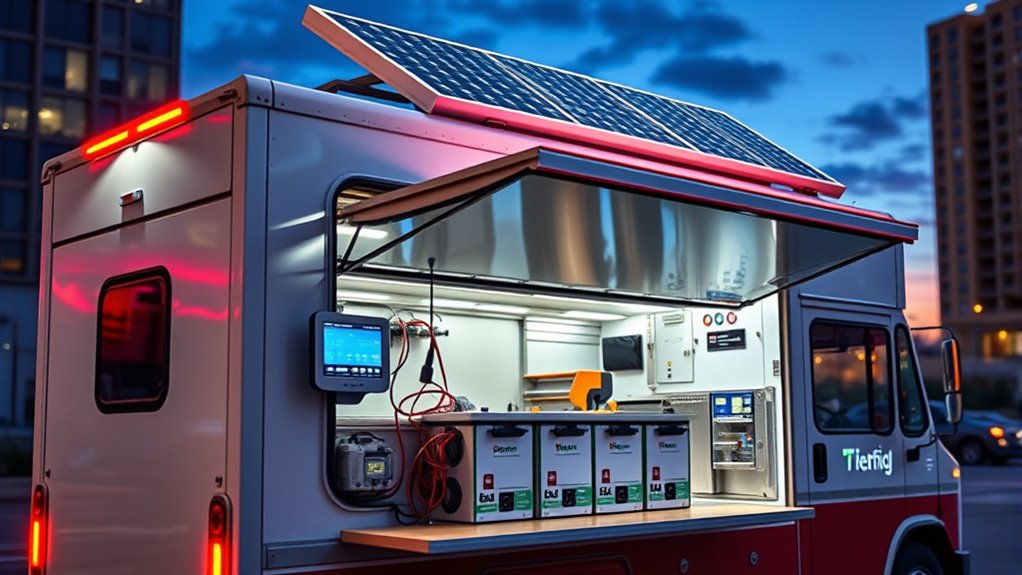
Battery systems and storage solutions are the backbone of a food truck’s power setup, ensuring you have reliable energy for all your equipment. They store excess power generated by solar panels or other sources, so your truck runs smoothly even without sunlight or grid power. Choosing the right batteries, like lithium-ion, provides long-lasting, efficient energy storage. Inverter options are vital, as they convert stored DC power into AC, usable for your kitchen appliances. Consider your energy needs carefully to select a system that offers enough capacity and flexibility. Properly sized batteries and inverter options give you the freedom to operate independently, reduce your reliance on external power, and keep your food truck running efficiently throughout the day. Total‑cost clarity can help you compare different systems and plan your investment wisely.
Managing Power Loads Efficiently
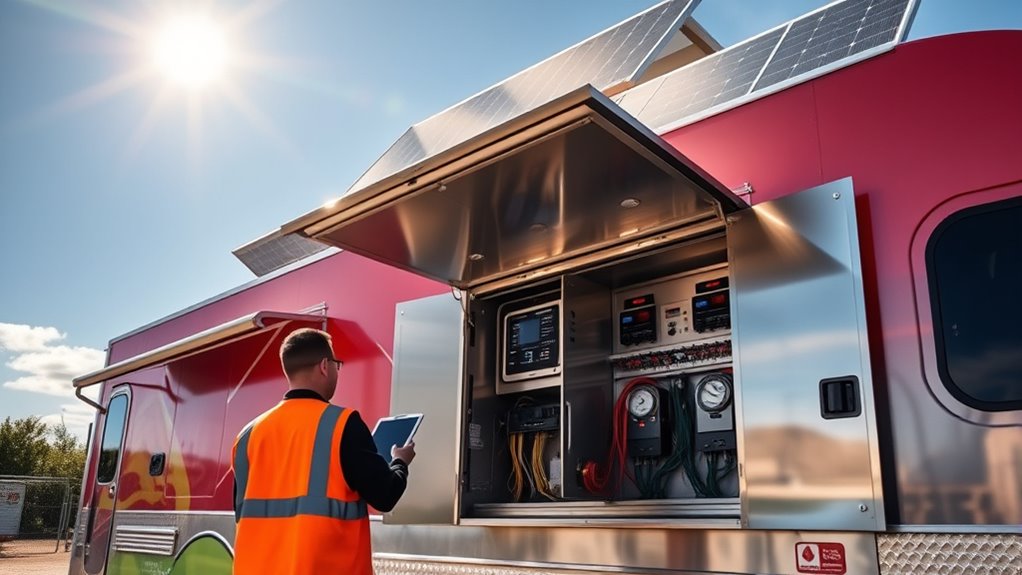
Efficiently managing power loads is essential to keep your food truck running smoothly without overtaxing your system. Start by prioritizing appliances based on their energy needs, ensuring high-demand items like ovens and refrigerators are balanced with lower-power devices. Next, optimize your inverter selection by choosing one that matches your peak power requirements and allows for future expansion. Incorporate solar energy whenever possible to supplement your power supply and reduce reliance on batteries. Finally, monitor your power consumption regularly with smart meters, so you can make adjustments proactively. This approach helps prevent overloads, conserves energy, and keeps your system reliable. Understanding your Gold IRA options can also help you diversify your investment portfolio for long-term financial stability. By balancing loads carefully, you maximize efficiency and maintain continuous operation during busy hours.
Wiring and Safety Considerations
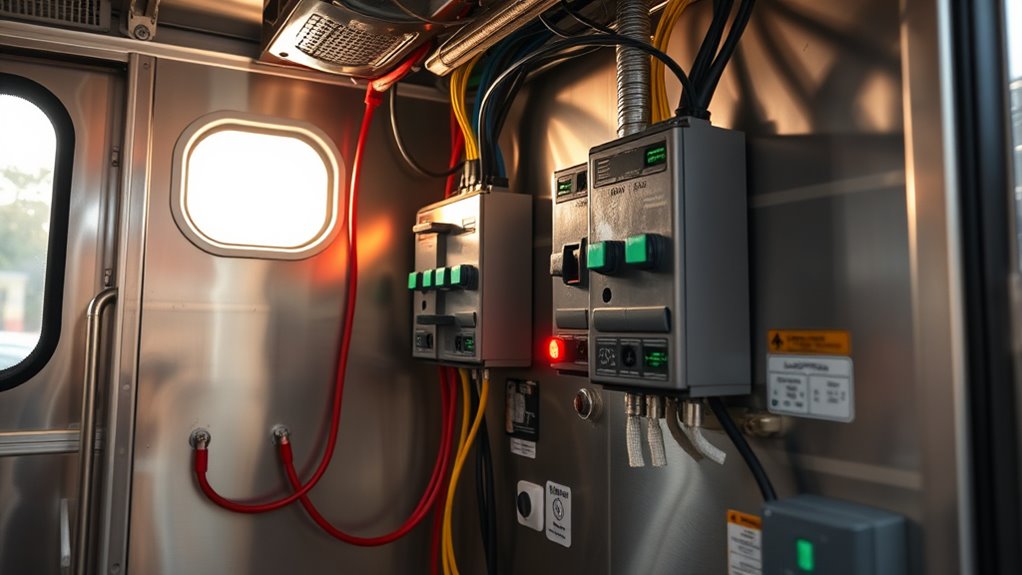
Ensuring proper wiring and safety measures is essential for the reliable operation of your food truck’s electrical system. Proper wiring insulation prevents accidental shorts, reduces fire risks, and guarantees safety during operation. Always use high-quality wiring designed for mobile food trucks, and double-check connections for secure insulation. Grounding safety is critical; it helps protect against electrical shocks and equipment damage. Make certain your electrical system is properly grounded according to safety standards, with grounding wires connected to a reliable earth ground. Regular inspections of wiring insulation and grounding connections help catch potential issues early. Additionally, understanding the importance of Dad and Daughter Bond can reinforce the value of careful attention to safety and connection in your electrical setup. By prioritizing wiring safety and grounding safety, you safeguard your equipment, staff, and customers, ensuring smooth, safe food truck operations at all times.
Troubleshooting Common Power Issues
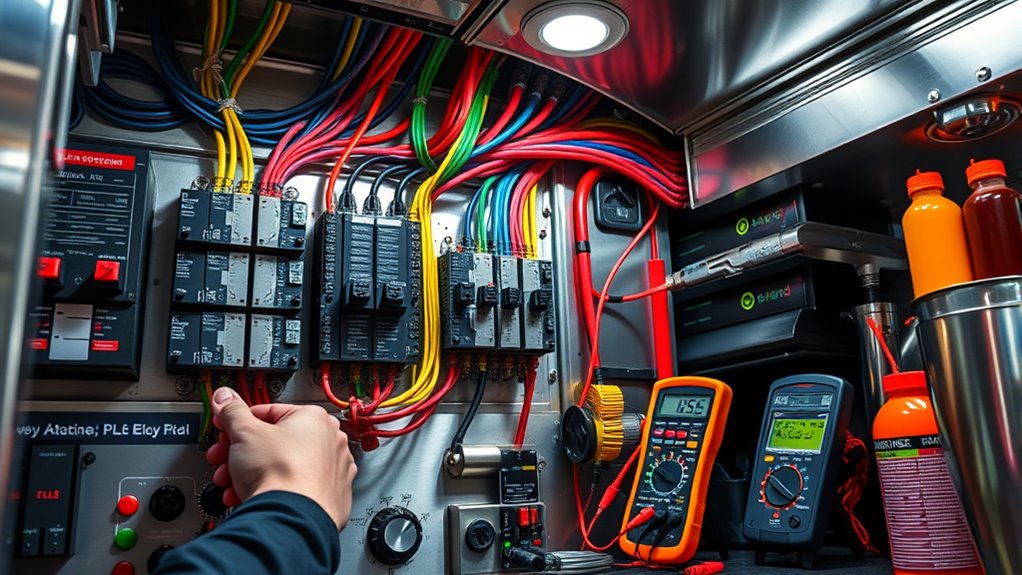
When your food truck experiences power issues, identifying the root cause quickly can save you time and prevent costly downtime. Start by checking your solar efficiency; dirt or shading on panels can reduce energy output. Next, verify your inverter sizing—an undersized inverter can cause power interruptions or overloads. Ultimately, inspect your wiring connections for loose or damaged cables that might disrupt power flow. Understanding how solar efficiency affects your system helps optimize energy collection, while correct inverter sizing ensures your appliances run smoothly without shutting down. Regularly monitoring these components allows you to catch issues early, maintaining a steady power supply and avoiding unexpected breakdowns. Additionally, assessing your contrast ratio can help determine if your lighting setup is affecting your visibility during operation. Quick troubleshooting keeps your food truck running efficiently and minimizes operational disruptions.
Tips for Maintaining Your Power System
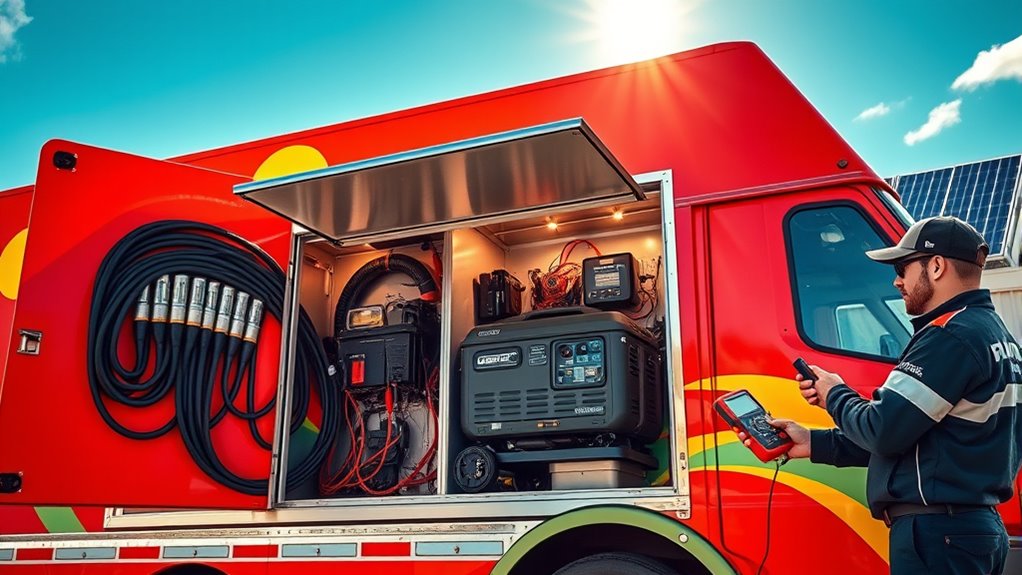
Regular maintenance is essential to keep your power system running smoothly and prevent unexpected failures. Start by inspecting your solar panels regularly for dirt, debris, or damage that could reduce efficiency. Clean them gently with water and a soft cloth to guarantee maximum sunlight absorption. Check connections and wiring to prevent corrosion or loose contacts. When it comes to inverter selection, choose a high-quality inverter suited to your power needs, and verify it’s functioning properly. Test your system periodically to ensure all components work together seamlessly. Keep an eye on voltage and current levels using a multimeter. Regularly updating your system’s firmware and consulting your manufacturer’s maintenance guidelines will help extend your setup’s lifespan and maintain reliable power for your food truck.
Frequently Asked Questions
How Often Should I Perform Maintenance on My Food Truck’s Electrical System?
You should perform maintenance on your food truck’s electrical system at least every three to six months. Regular battery maintenance ensures your power source stays reliable, and wiring inspections help catch potential issues early. Keep an eye on corrosion, loose connections, and overall battery health. Consistent checks prevent unexpected breakdowns, keep your equipment running smoothly, and extend the life of your electrical system, saving you time and money in the long run.
Can I Upgrade My Power System as My Business Grows?
Absolutely, you can upgrade your power system as your business grows—think of it as giving your truck a muscle boost. Power system upgrades and electrical capacity expansion are straightforward, allowing you to handle more equipment and demands. Just plan ahead, consult professionals, and guarantee your wiring and components can support the new load. After all, a bigger business deserves a bigger, more reliable power setup.
What Safety Certifications Are Recommended for Electrical Installations?
You should guarantee your electrical installations meet grounding standards and certification requirements. Look for certifications like UL or NEC compliance, which verify safety and proper wiring. It’s essential to follow grounding standards to prevent electrical shocks and fires. Always hire licensed electricians familiar with local code requirements to handle your setup. Regular inspections and adherence to certification requirements keep your food truck safe, compliant, and ready for business growth.
How Do Weather Conditions Affect My Food Truck’s Power Systems?
Rain or intense heat can markedly impact your food truck’s power systems. Wet weather decreases solar efficiency, reducing your solar panels’ ability to generate power, while extreme temperatures strain your battery storage, risking capacity loss. You need to monitor weather forecasts closely and adapt by maximizing solar during clear days and managing battery use during storms or heatwaves. Proper insulation and backup power sources can help maintain consistent operations despite weather challenges.
Are There Eco-Friendly or Solar Power Options Suitable for Food Trucks?
Yes, eco-friendly options like solar panels and battery storage are great for food trucks. You can install solar panels on your roof to harness sunlight and reduce reliance on traditional power sources. Pairing this with efficient battery storage allows you to store excess energy for cloudy days or nighttime use. This setup helps cut costs, lowers your environmental impact, and keeps your truck powered sustainably.
Conclusion
Now that you’ve got the basics down, you’re well on your way to keeping your food truck humming smoothly. Think of it like tending a garden — with a little attention and care, your power system will flourish, supporting your culinary adventures without a hitch. Stay attentive, perform regular check-ins, and enjoy the ride. With these simple tips, you’ll keep your power flowing happily, so you can focus on what you do best: serving up great food.
